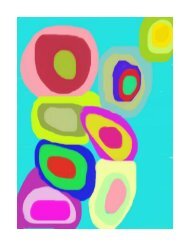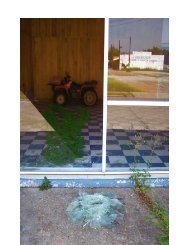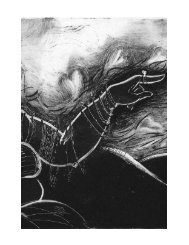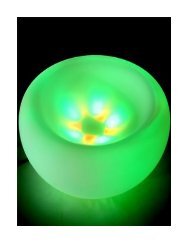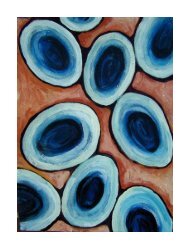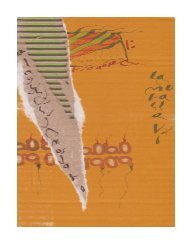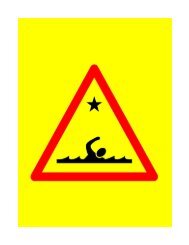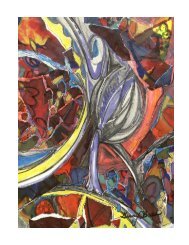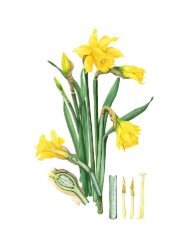Commentaries on Bob Cobbing - The Argotist Online
Commentaries on Bob Cobbing - The Argotist Online
Commentaries on Bob Cobbing - The Argotist Online
You also want an ePaper? Increase the reach of your titles
YUMPU automatically turns print PDFs into web optimized ePapers that Google loves.
<strong>Cobbing</strong>: You can’t escape it.<br />
I can say from pers<strong>on</strong>al experience that reflects <strong>Cobbing</strong>’s opini<strong>on</strong> throughout the period. I do not<br />
say that his attitude did not change; but the changes such as they were, reflected changes of<br />
emphasis.<br />
I imagine him learning at some point, probably rather early, of the category “sound poetry” and<br />
finding it approximated to what he did or wanted to do. As an existing category, it gave him<br />
permissi<strong>on</strong>; but it also c<strong>on</strong>strained. It obviated those who proscribed with “that’s not poetry” but<br />
it left him open to discussi<strong>on</strong>s of the category; and I am unsure how much he welcomed that.<br />
Going back to Hans<strong>on</strong>’s essay and to the interview in Riding the Meridian, there is this:<br />
<strong>Cobbing</strong>: […] Music and sound poetry are not the same thing at all. […] sound poetry is<br />
much more c<strong>on</strong>cerned with articulated speech than it is with melody and harm<strong>on</strong>y and so<br />
<strong>on</strong>. It may sound like music sometimes but it’s much nearer to speech than it is to music.<br />
Upt<strong>on</strong>: That’s really interesting. I d<strong>on</strong>’t really disagree with you. But you have used the word<br />
“s<strong>on</strong>g” in your—<br />
<strong>Cobbing</strong>: All right, I called a publicati<strong>on</strong> S<strong>on</strong>g Signals, but I still d<strong>on</strong>’t think the result is s<strong>on</strong>g.<br />
[…] <strong>The</strong> notati<strong>on</strong> is stimulus for sound and a lot of people wouldn’t distinguish between what<br />
we do and s<strong>on</strong>g; but I do. I think what we do is articulated speech rather than s<strong>on</strong>g.<br />
Despite his informed awareness of how <strong>Bob</strong> classified his poetry, Hans<strong>on</strong> stresses the taperecorder<br />
and recording studio, the basic tools of text-sound compositi<strong>on</strong>, as both a new medium<br />
and as a means of analysis of the poet’s own voice. He sees “taped works” and “live performances”<br />
as likely outcomes of such analysis.<br />
Hans<strong>on</strong>’s judgment of the literary rather than musical attributes of the tape work that he sees as<br />
<strong>Cobbing</strong>’s most assured work matches <strong>Cobbing</strong>’s judgments of 1999. When I was working <strong>on</strong> the<br />
Hans<strong>on</strong> essay, for its inclusi<strong>on</strong> in the Ceolfrith book, I asked <strong>Bob</strong> how he reacted to what Hans<strong>on</strong><br />
had said (including, for instance, that there was a lack of c<strong>on</strong>fidence in his means of expressi<strong>on</strong><br />
prior to 1999); and he said that he agreed with everything Hans<strong>on</strong> said.<br />
And yet, in ‘An Approach to Notati<strong>on</strong>’, he describes his “blotting” poems in S<strong>on</strong>g Signals [4] as ‘very<br />
musical… and seems to need instrumental participati<strong>on</strong> as well as voices’.<br />
He makes this statement after telling us ‘it is used for its sound and visual qualities rather than its<br />
objective meaning’; but I am not sure that the asserti<strong>on</strong> of its musicality is explained. That seems<br />
to me to inhere in <strong>Cobbing</strong>’s expectati<strong>on</strong> of how it will be read as notati<strong>on</strong> rather than in the<br />
notati<strong>on</strong> itself.<br />
Further <strong>on</strong>, he refers to Jerome Rothenberg’s saying that ‘in Navajo experience poetry and music<br />
and dance haven’t suffered separati<strong>on</strong>’. For me, that sits uncomfortably with his claim that music<br />
and sound poetry are not the same, al<strong>on</strong>g with his endorsement of Hans<strong>on</strong>’s analysis.



